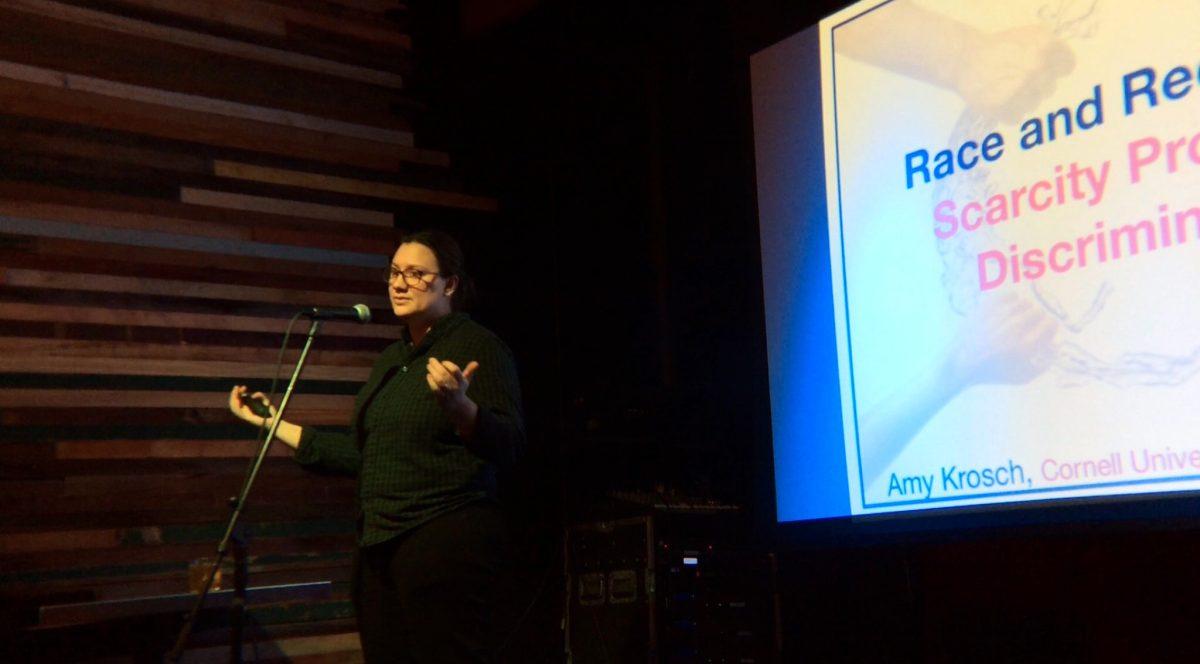It’s some point during the mid-1990s, and Amy Krosch is sitting in a sixth-grade classroom in rural Minnesota. She and her classmates have been learning about the Dakota Uprising — a 1862 conflict between U.S. settlers and the native Dakota tribe. The narrative their teacher is telling them isn’t an unfamiliar one: both groups of people had been living peacefully throughout times of abundance, until a rough period of less fruitful crops and limited resources created intergroup conflict.
“I think there’s probably a lot wrong with that overarching narrative of peaceful harmony, it’s probably a lot more complicated than that,” says Krosch. “But the idea that really stayed with me was this idea of intergroup relations really being more harmonious during times of relative abundance, versus relative scarcity.”
It’s now a snowy night on Nov. 28, 2018, and Krosch is an Assistant Professor in Cornell University’s Department of Psychology. Inside Ithaca’s Casita Del Polaris, Krosch is discussing the very issue that sparked her interest so many years ago: race and recession. She’s the presenter for the latest edition of “Science on Tap,” a monthly event that connects the Ithaca community with Cornell researchers. “Science on Tap” features a different topic and lecturer each month.

Economic Scarcity: Not Everyone is Hit Evenly
While the sixth-grade history lesson had stuck with Krosch for over a decade, it wasn’t until she began her doctoral studies in social psychology that her interest was finally put into action. It was the height of the Great Recession, and Krosch began noticing something statistically alarming.
“What was especially troubling to me, as somebody interested in issues of social justice, was the observation that as the economy was declining and resources were becoming more scarce, the burden seemed really unevenly distributed,” says Krosch.
Research showed that while everybody was impacted by the recession — racial minorities were getting hit harder. Compared to their white counterparts, a disproportionate number of them were being forced to take unpaid leave or work fewer hours — thus, lowering the amount of overall household wealth as well.
What was causing this uneven distribution? Krosch says that some factors appear to be structural — for example, minorities are statistically more likely to be employed in blue collar industries, which are more vulnerable to economic duress. But Krosch also realized that there may be psychological factors playing a role in this issue.

The Battle for Resources
Krosch says that there is a psychological explanation as to why minorities may face more discrimination during periods of scarcity.
“When white Americans perceive their resources to be scarce, it can influence their judgements and beliefs of racial minorities deserving [these resources],” says Krosch. “It can shift their attitudes and stereotypes of racial minorities, and it’s always in a negative direction — presumably to justify withholding these resources.”
This idea may seem theoretical, explained Krosch, but it becomes very real — particularly when white decision makers are threatened with less resources, and as a result, give racial minorities less resources in attempts to preserve their own.
However, another more indirect psychological factor is a perceptual one: resource scarcity can create more distinct divisions among a group of people. For example, under resource scarcity, white people — often well-meaning ones, and often without realizing it — are more likely to lump people of mixed-race into minority groups. Under conditions where resources are abundant, these same mixed-race individuals tend to not be categorized as such.
Putting it Together
So, what does this all mean?
Krosch says that this information matters, because if we want to tackle inequality as a society, we have to first examine the underlying factors that give rise to these issues. She says it also shows that when people are put in positions where their resources are at stake, they seem to lose some sense of cognitive control. This subtle and pervasive psychology can make discrimination reduction tactics all that more challenging to implement.
However, Krosch does think it’s possible to overcome these innate, human biases. By bringing awareness to this issue, we can challenge our own perceptions, and recognize that they don’t always reflect reality.

Krosch finishes her presentation by drawing a parallel between this research and the current political state in the United States — as illustrated in the political rise of Donald Trump, whose campaign heavily focused on concerns regarding illegal immigration.
“[One take] is that it’s all about economic anxiety. Another take is that it’s all about racism,” says Krosch. “But I think this research really suggests a clear way that they intertwine — our economic concerns are racial concerns. And when there is a subjugated minority and white people feel that their resources are being infringed upon or are scarce, then that minority is going to suffer these consequences of heightened discrimination.”







